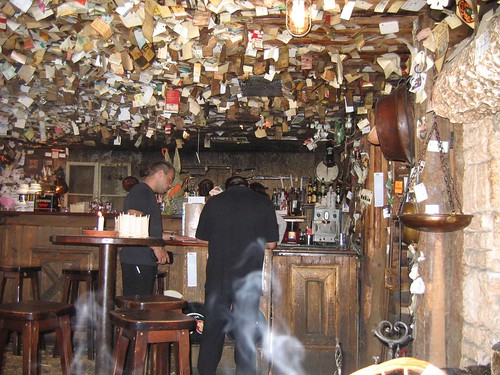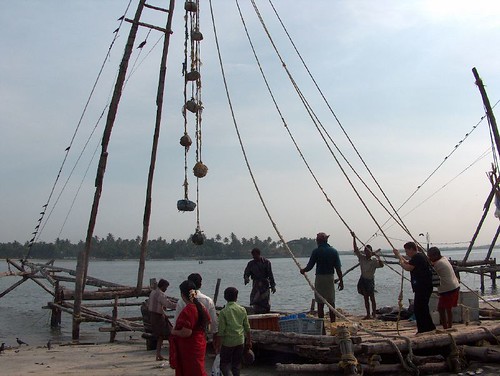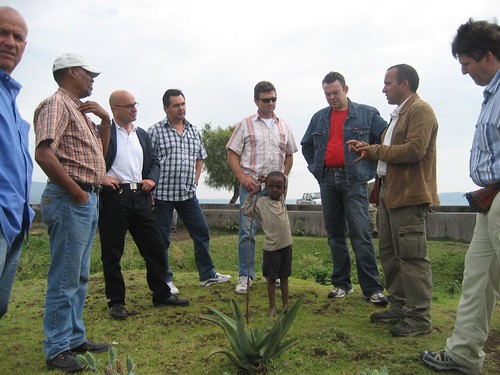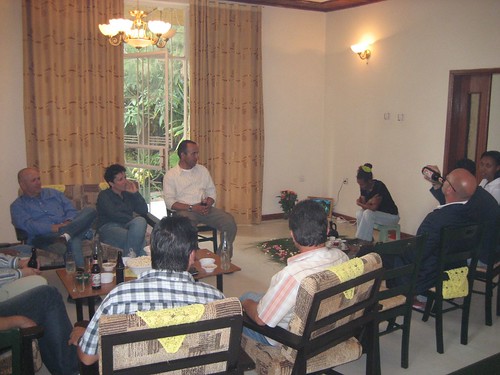We all familiar with story about Alice approaching a junction in the wood, wondering to turn to the left or right. The advice given by Cheshire the cat is well known in the business scene: firstly, plan where you want to go, than move towards it.
Nancy Dixon demonstrate an insightful series of three great posts describing where KM had came from and what she sees for its future, ahead. It is not only a chronological and comprehensive description of this field, but it is also a closer, intimate and self-critic on what it is all about, and what happened to it along the way. It looks also at the role of the KM professionals and practitioners in the field.
After more than ten years in the Israeli organizations scene, and as one of the very first beginners of KM practitioners here, these series motivate me to lay my own perspective and look at similarities as well as dissonances, too.
Towards the end of the 90', the term KM (Knowledge Management) was coined as if it is the relief and solutions to a very serious challenge organizations were facing: Since we are aware of our people's knowledge, know how and experience – is a priceless gift, the emerging notion of KM lead to think that Knowledge can be managed and we can actually manage it….. we know now that it can't be done and we are regret of the disproportional power we relate to this KM issue. As a matter of fact, my first advice or tip I share with colleagues, customers and also newcomers to this field, in regard, is this: 'If you want a success in implementing Knowledge Management in the organization – Do not use this term in public'!

Bangalore, India
So, why this became the main obstacle in the way of organizations becoming a Learning organizations managing their knowledge?
The use of the term "Knowledge management" lead to formulation of a myth in which "Knowledge" cane be "Managed" by technological systems, as if 'Knowledge' is something substance you can grab by hand from it is now (people's head..), create a repository of these 'its' (A database), and deliver it or make it generally usable and corporate-wide available (upon the Intranet portal). This illusion was strongly offer to organizations as a dramatic solution to all organizational challenge. Just another simple case of "If we build it they will come". Than, as a need to produce visible deliverables, it was cheerfully adopted by organizations, and after initiating these tremendous and expensive IT projects titled "KM systems", they had something to show: "This is our KM portal". We build it, and now they will come.
But, "they" didn't.

Budapest, Hungary
So, here is a question was put and it was well crafted by my colleague David Gurteen: "How can we make them use it?".
Firstly, since Knowledge is not Information, nor Data. You can look for, collect, sometimes even to store and than maybe to retrieve it. But, as Larry Prusak said when we met him in Israel few years ago: "Knowledge is Profoundly social". Is created and nurture within social interactions between people who seek to learn and share what they know with people that have common interest. It rises within a dialog and conversations. I t does not have a stable or fix and structured form. It cannot be put in a reservoir…
Secondly, Knowledge is not stable, unchangeable. IT is dynamic, change forms, developing and updated continuously, situation-contexted, culture-dependent, affected by randomly-changing environment. Therefore, we cannot say that if "we collect" all the current knowledge" and than, "put it somewhere" – we will know "more" than we knew before.

Cochin, Kerala, India
Thirdly, in every stage we pass on our route from the "tacit" knowledge to the "explicit" knowledge, we lose something. It was Micahel Planyi, trying to conceptualize what happened to knowledge, who said that "We always know than we can tell…". Later, my colleague Dave Snowden, followed by saying that "We always know, more than we can tell, and we always tell more than we can write down".
Let's have a look at this one, closer: What organizations actually did, was precisely in the wrong direction to what they were ought to do if they were willing to "capture" knowledge. As explained above, instead of emphasizing on the "Know" stage (which is obviously hard to find and reach), since they couldn't reach the "know" stage, they had to go 'down' in line to the "write down" stage. This is something , they can 'get'. This was the start of dealing with KM as a systems that collect Word documents, PowerPoint sideshows, PDFs, Spreadsheets, etc – and put them in a database which now have a trendy and fan name: "Knowledge management system".

Bet Lehem at the Galillee, Israel
Organizational 'Yellow Pages' start flourish like mushrooms after the rain: "Each person will write "what he knows" and we will have a Knowledge Management yellow pages which will include all knowledge we "have". These efforts are expensive in time, fatigue their participants and frustrating at the "end". People tend to under-estimate or over-estimate their skills levels and knowledge, even in expertise in which their are considered as experts. I do not know about you, but I once tried to write down "what I know..". A very frustrating task. Not only that: till the time these efforts "ends" the "knowledge" in it is outdated…
Fourthly – and to my opinion, the most challenging of all, is the Culture and Human character issue. The effort towards establishing "An all the knowledge we have here" system, is mistakenly based on an assumption that "They will com". That someone who need knowledge to carry out a mission, would care to look for information and learn (and above all, from a "System") from something that someone else whom he may or may not know in advance. I doubt if it is the case in many occasion. We as humans in organizations and in general tends to be 'creative', i.e., to invent our own version of "Knowledge" rather to learn and share.
As a result to move forward to the "Know" level, and based on the ideas and work of Etienne Wenger, we started to see what is called "Communities of Practice" which became common in many organizations. Yet, again, the core idea of COPs was people gather together, face to face, to learn talk and share. However, technology took a significant part that enable people to "meet" virtually, asynchronously, which is a good thing in that sense as well, BUT if the soft ingredients of this notion would be presented to the people involved in COPs and if they were prepared in this new and emerging socio-technical reality and environment.

Tabor Herbs Farm, Awassa, Ethiopia
Communities may be a noble value, yet – Practice? Is there only one way in doing things in organization? How it is relate to the fact that knowledge is dynamic, that organization are complicated and complex scenes? Adopting these COPs as a standard tool blocked people from trying to experience and learn from their own experience. Adaptation in that sense bare no footprints in practice.
And so, the young and pre-mature field of Knowledge management who came into organization arena as a method to become more effective and efficient – was cruelly taken as a 'hostage' by the forces of Technology, and we started to see that every software or information system was market-driven re-positioning itself to be 'A KM solution', have 'A KM Module' within that was developed especially for that reason only, designed to suite 'The KM needs', and the most amusing I saw was an information system that its brochure shamelessly declares: "KM Ready"…..No matter what, long live the new trend….
But, we cannot and should not put it all on the Technology. The Academia was there and still is, too. Torn apart by budget constraints, looking for new ways to compete with the rise of new academic institutions that confronts their many-years-hegemony, open its arms towards the new 'discipline', embrace it and absorb it. However, if it would only be embraced towards the relevant field – Management…And therefore we see more and more programs that titled Knowledge Management when you scratch the upper layer and dig into the syllabus we will find that these programs equate Knowledge = Information, and so you have these studies in two fields: Computer Science and IT in one hand and Information Studies at the other hand. Meaning, they are teaching Information systems, databases, software, etc – in Computers & IT and cataloging, Information specialists studies etc – in Information studies. You can find in both branches seminars in Portals, Content management etc. These are very important issues, yet they are not Knowledge Management. Hence we are leaving in a consumer/customer world, it "Sells".
Knowledge Management deals with Management, and as Peter Drucker said: "Manage knowledge means manage one self". In doing so, anagers find themselves in a unique and new situation: Their people knows more than they know, they do not want to be lead by managers who knows less then they know, so how you can "Manage their knowledge?". Goffee and Jones called it Leading Clever people.
Both sides, managers and workers, have to change and adapt to this new form of relations between them, their people and the business environment. Mangers should start to learn how to lead people that know much more than they do, and workers should change the way they deals with what they know; they have to become managers, in the sense that they must manage what they know, locate and contact colleagues with same interests or take part in the same projects. By doing so, they will fully implement the idea of Organizational Learning and Managing Knowledge.
Aiming towards the "Tell"
It is not true that people do no want to share their knowledge, on the contrary: people will be happy to share what they know – if only they will be sure that their knowledge gets real attention, by people who want to learn from them, and not to "take" their knowledge from them.
Following Polanyi, and based on many years of practicing and helping organizations, I am convinced that if we cannot really reach the 'Know' target (what people really know), and if we are aware that what people "Write" is not their knowledge (but documents and files they produce for certain context), we should focus on the more effective and highly developed "technology" ever invented which is the "Tell".

Awassa, Ethiopia
Managers should encourage people to meet, talk, learn and share. This is their main responsibility today: to enable their people to meet, create and share their knowledge, which will be translated into new products and services, formulating new and effective methods.
Each one have a story to tell, each one should be heard telling its story. No question: it takes time to hear these stories, it takes time to tell them. It is also time-consuming to absorb its meanings and to make sense of it. At least one evident documented in which it made its impact where "nothing else worked" as stated Steve Denning, trying to catch management attention to the program of Knowledge Management at the World Bank. Yet, Storytelling is not just "telling a story", but a powerful tool and mean that can be carefully use. It gives the hearer a mental relief without 'loosing' his awareness and conscious. Above all, it is an effective way to transform norms and values, to clarify complicated and complex situations and tasks and to make sense.
Technology, has its own role in formulating this "enabling environment". These are what we now call web 2.0. It stands for a general term to represent software applications that enable people to create and share content in any form, on the Internet – in which sharing let people learn more and integrate their knowledge with others, may this content be text, blogs and micro-blogs, photos, videos, sideshows, favorites bookmarks and more.
Organizational Knowledge Networks
We start to see that organizations establish knowledge networks in which the Intranet portal is 'town square' in which people get to know each other, talk, discover colleagues and develop relations, tell and share their stories, create new knowledge together.

Lucca, Italy
These relations can later be develop and broaden, in building and managing their Online Personal and Professional Presence, using sharing-software applications. We see knowledge networks in which the former organizational "Directory" is now a network constructed with each person's blog is junction to as many other blogs with as many connection possible. This network acts synchronically or asynchronically, based on circumstances. In the blog posts or links-lists each one can share their stories and knowledge.
